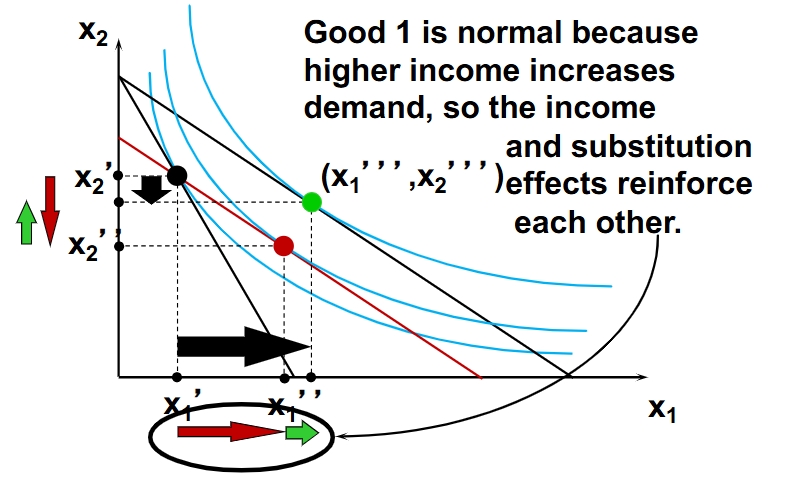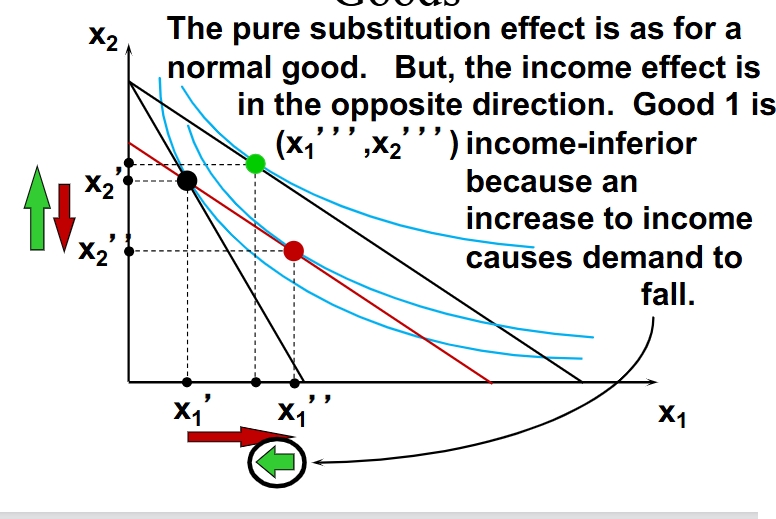Slutsky decomposition- Micro Theory
1/11
There's no tags or description
Looks like no tags are added yet.
Name | Mastery | Learn | Test | Matching | Spaced |
|---|
No study sessions yet.
12 Terms
What is the Substitution effect?
This is when the commodity is relatively cheaper, so consumers substitute it for other, now relatively more expensive, commodities.
What is the income effect?
The consumer’s budget of y can purchase more than before, as if the consumer’s income rose, so the consequential effect is that the consumer will treat the commodities based on feeling as if their income rose.
What does Slutsky say about a price change as it retains to income when less income is needed to purchase the original bundle?
If less income is needed, then “real income” is increased (even though real income might’ve not necessarily increased, it could just be that prices fell)
What does Slutsky say about a price change as it retains to income when more income is needed to purchase the original bundle?
If more income is needed, then “real income” decreased (even though real income might’ve not necessarily decreased, it could just be that prices rose)
What is a “Pure” Substitution Effect?
This is when lower prices make one good cheaper in comparison to another good, so you substitute the cheaper good for the relatively more expensive good. P1 decreases, so you substitute X1 for X2.
If the price of a good decreases, would the substitution effect ever cause a decrease in the quantity demanded of that good?
No, that would violate the weak axiom of revealed preferences.
If the price of a good increases, would the substitution effect ever increase the quantity demanded of that good?
No
What is an overall effect?
This is when the substitution effect and income effect are both applied to the same situation.
What is the overall effect for a normal good?
When a normal good experiences income and substitution effects, they will reinforce each other. If a normal good becomes cheaper, then it will be substituted for another good. The demand for that good will go up, and more will be purchased because higher income increases with higher demand. (Reminder that Slutsky perceives “real income” as increasing if the original bundle is cheaper)

What is “The Law of Demand” (again)?
As the demand for a good increases, the price of a good decreases (and Vice versa).
What is the overall effect for a income-inferior good?
Income inferior goods have opposing substitution and income effects. The substitution effect will cause more inferior goods to be purchased when the price is lower. However, the income effect will cause no inferior goods to be purchased at a lower price because the income effect will cause the demand of the good to decreases. (Under the idea that you make enough income where you shouldn’t purchase the inferior good at the lower price and buy a normal good instead).

What is the overall effect for a Giffen Good?
The substitution effect will cause the demand of giffen goods to decrease as the price rises, however the income effect will cause demand to increase as the price falls. The substitution and income effects still work in the opposite direction, because it’s revealed that all giffen goods are inferior goods. (But not all inferior goods are giffen goods).